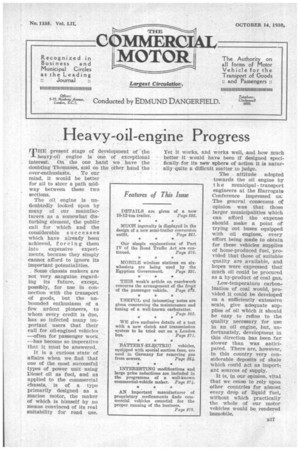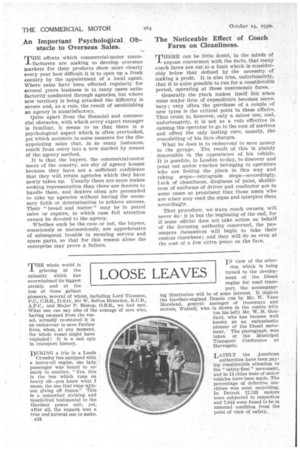Heavy-oil-engine Progress
Page 43

Page 44

If you've noticed an error in this article please click here to report it so we can fix it.
rr HE present stage of development of the -Iheavy-oil engine is one of exceptional interest. On the one hand we have the doubting Thomases, and on the other hand the over-enthusiasts. To our mind, it would be better for all to steer a path mid way between these two sections.
The oil engine is undoubtedly looked upon by many of our manufacturers as a somewhat disturbing element, the public call for which and the considerable successes which have already been achieved, forcing them Into expensive experiments, because they simply cannot afford to ignore its important potentialities.
Some chassis makers are not very sanguine regarding its future, except, possibly, for use in connection with the transport of goods, but the unbounded enthusiasm of a few ardent pioneers, to whom every credit is due, has so infected many important users that their call for oil-engined vehicles —often for passenger work --has become so imperative that it must be answered.
It is a curious state of affairs when we find that one of the most successful types of power unit using Diesel oil as fuel, and as applied to the commercial chassis, is of a type primarily designed as a marine motor, the maker of which is himself by no means convinced of its real suitability for road use. Yet it works, and works well, and how much better it would have been if designed specific-ally for its new sphere of action it is naturally quite a difficult matter to Judge.
The attitude adopted towards the oil engine by the municipal-transport engineers at the Harrogate Conference impressed us: The general consensus of opinion was that those larger municipalities which can afford the expense should make a point of trying out buses equipped with -oil engines; every effort being made to obtain for these vehicles supplies of home-produced fuel, provided that those of suitable quality are available, and hopes were expressed that much oil could be procured as a by-product of coal gas.
Low-temperature carbonization of coal would, provided it could be developed on a sufficiently extensive scale, give adequate supplies of oil which it should 'be easy to refine to the quality necessary for use in an oil engine, but, unfortunately, development in this direction has been far slower than was anticipated. There are, however, in this country very considerable deposits of shale which could act as import! ant sources of supply.
It is, in our opinion, vital that we cease to rely upon other countries for almost every drop of liquid fuel, without which practically the whole of our motor vehicles would be rendered immobile.
An Important Psychological Obstacle to Overseas Sales.
THE efforts which commercial-motor manu facturers are making to develop overseas markets for their products show more clearly every year how difficult it is to open up a fresh country by the appointment of a local agent. Where sales have been effected regularly for several years business is in many cases satisfactorily c.onducted through Agencies, but where new territory is being attacked the difficulty is severe and, as a rule, the result of establishing an agency is unsatisfactory.
Quite apart from the financial and commercial obstacles, with which every export manager is familiar, it seems to us that there is a psychological aspect which is often overlooked, yet which accounts in some measure for the disappointing sales that, in so many instances, result from entry into a new market by means of the agency method.
It is that the buyers, the commercial-motor users of the country, are shy of agency houses because they have not a sufficient confidence that they will retain agencies which they have newly taken up. Usually there are more makes seeking representation than there are dealers to handle them, and dealers often are persuaded to take up agencies without having the necessary faith or determination to achieve success. Their "bread and butter" may be in petrol sales or repairs, in which case full attention cannot be devoted to the agency.
Whether such be the case or not, the buyers, consciously or unconsciously, are apprehensive of subsequent trouble in securing service and spare parts, so that for this reason alone the enterprise may prove a failure. The Noticeable Effect of Coach Fares on Cleanliness.
ffiHERE can be little doubt, in the minds of -L anyone conversant with the facts, that many coach fares are cut to a limit which is considerably below that defined by the necessity of making a profit. It is also true; Unfortunately, that it is quite possible to run for a considerable period, operating at these uneconomic fares.
Generally the pinch makes itself felt when some major item of expenditure becomes neces Isary; very often the purchase of a couple of new tyres is the critical point in these affairs. That crisis is, however; only a minor .one;. and, unfortunately, it is not as a rule effective in causing the operator to go to the root of matters and effect the only lasting cure, namely, the remodelling of his fare charges.
What he does is to endeavour to save money in the garage. The result of this is plainly discernible in the appearance of his vehicle. It is possible, in London to-day, to discover and point out motor coaches belonging to operators who are feeling . the pinch in this way and taking steps—retrograde step's—accordingly. Lack of cleanliness, dinginess of paint, shabbiness of uniforms of driver and conductor are in some cases so prominent that those users who . are wider may read the signs and interpret them accordingly.
That procedure, we warn coach owners, will never do : it is but the beginning of the end, for if some official does not take action on behalf of the licensing authority concerned, the passengers themselves will begin to take. their custom elsewhere; and they will do so even at the cost of a few extra pence on the fate.




















































































































